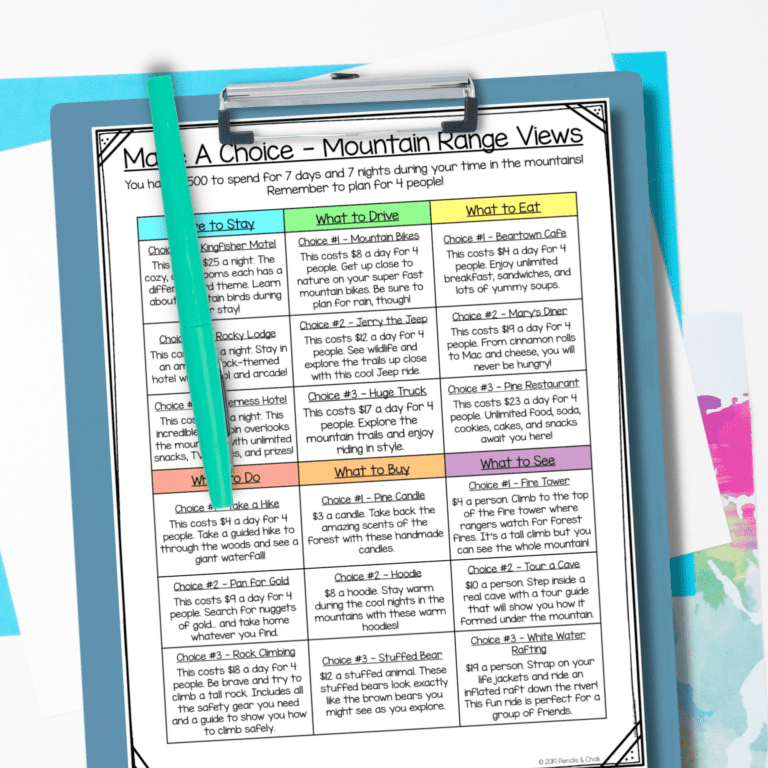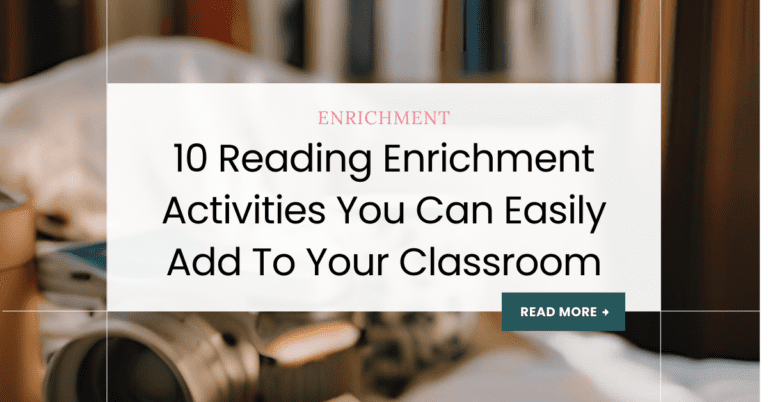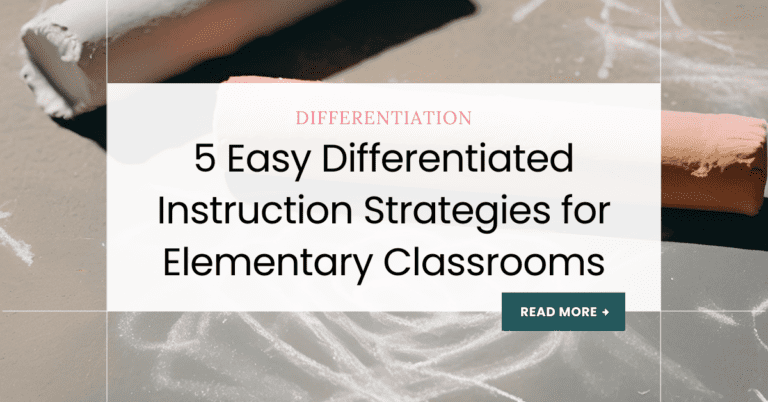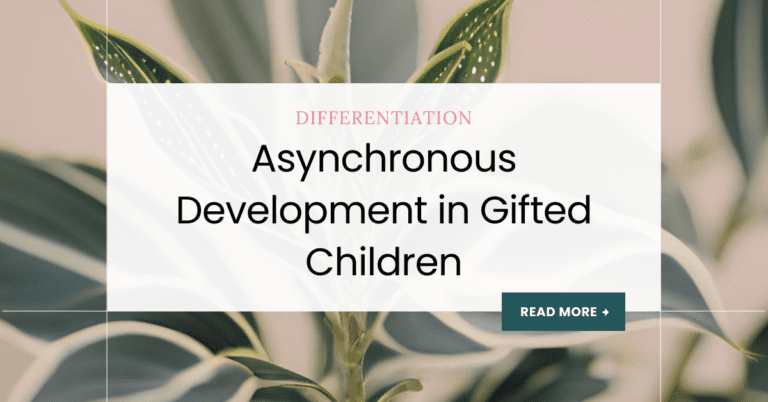Identifying giftedness early in a child’s educational journey is incredibly important to nurture their unique talents and abilities, allowing them to reach their full potential.
Gifted children possess exceptional cognitive, creative, and problem-solving skills that, when recognized and supported, can lead to remarkable achievements and contributions to society.
However, a lack of support and late identification can lead to students feeling bored, unmotivated, misunderstood, and unaware of their unique needs.
Further, identifying gifted children early can allow them to experience differentiated instruction that is unique to their specific thinking skills, prevent boredom or poor behavior, and foster healthy peer relationships.
Keep reading to learn more about how essential early identification of giftedness is and how you can help YOUR students that you believe need gifted support!
Table of Contents

Why Identifying Giftedness Early Matters for Children
Identifying giftedness early is often accomplished through a collaborative effort of parents, teachers, and others who notice that a child has a particular ability or pronounced thinking skills.
As an educator who wrote GIEPs (or Gifted Individual Education Plans), a criterion for identification that I looked at was a survey of parents and teachers.
I relied a lot on what parents and teachers noticed in a child’s academic and personal life to decide what types of accommodations would best serve them.
It’s imperative that if you suspect your child or a student you work with may be gifted, you collaboratively work together with others who are qualified to make appropriate determinations about how to ensure they succeed.
What Does Identifying Giftedness Early Offer To Children?
Typically, students should be screened for gifted markers sometime around 1st or 2nd grade.
Waiting too long to identify them can lead to boredom or a lack of motivation. If children are not challenged and find their school work easy, they will eventually “hit a wall” where work becomes difficult.
However, they won’t have experienced work being a challenge before. A lack of challenges means that they never learn the essential skills of working through a difficult problem.
How Does Identifying Giftedness Early Impact A Child’s Education?
Education should not be “cookie cutter” and identifying giftedness early in a child’s educational career allows them to experience the most differentiation possible.
With us living in The Information Age, we have endless ways to challenge and support ALL students.
Here are some examples of how ensuring students have the resources they need can support gifted learners:
- Tailored Education: Gifted children have unique thinking skills that require more challenging and stimulating educational experiences. Early identification allows parents and educators to shift gears and tailor their teaching methods, curriculum, and pace to match the child’s advanced abilities.
- Social and Emotional Development: Gifted children may experience unique social and emotional challenges due to their advanced cognitive abilities. This is particularly true for children who have other learning needs (often referred to as dual exceptional or 2e children). Early identification enables parents and teachers to address these issues and provide guidance and support.
- Preventing Underachievement: Without appropriate challenges and support, gifted children may become bored and disengaged in a traditional classroom setting. The lack of challenges will hold students back and prevent them from reaching their full potential in and out of the classroom. Early identification helps prevent underachievement and ensures that gifted students remain motivated and eager to learn.
- Optimal Talent Development: Identifying giftedness early allows for the identification of specific talents and passions in the child. By nurturing these talents from a young age, educators and parents can help the child become an expert in their chosen field later in life.
Signs of Giftedness in Children
Giftedness goes well beyond traditional academic achievement. In fact, some gifted students are not as academically advanced as others!
However, all gifted children possess some combination of intellectual, creative, and emotional characteristics that set them apart from their peers.
As you look at the children around you, here are some common signs of giftedness to look out for:
- Early Language Development: Gifted children may display advanced language skills, exhibiting an extensive vocabulary and the ability to comprehend complex sentence structures at an early age.
- Rapid Learning: Gifted children tend to grasp new concepts quickly and may show a deep understanding of abstract ideas that are beyond their age level.
- Curiosity and Inquisitiveness: A strong desire to explore, ask questions, and seek knowledge is a prominent trait in gifted children.
- Excellent Problem Solving: Gifted children can solve problems creatively and often propose innovative solutions to challenges.
- Exceptional Memory: Some gifted children have an impressive memory, being able to recall information and experiences with remarkable accuracy.
- Intense Focus and Concentration: Gifted children may become engrossed in activities they are passionate about, demonstrating intense focus and concentration.
- Highly Imaginative: Gifted children often have vivid imaginations and may engage in elaborate pretend play or create imaginative stories and artwork.
- Sensitivity and Empathy: Gifted children may exhibit heightened sensitivity and empathy, showing a deep concern for others’ emotions and well-being.
Gifted students may not exhibit all of these qualities. However, most gifted students will display at least 2-3. Remember, don’t look ONLY at academic achievement! Look for problem-solving skills, unique thought patterns, and above-average aptitude.
Strategies to Help Teachers Identify Giftedness Early
Teachers play an absolutely PIVOTAL role in identifying and nurturing giftedness in their students!
While it can be a challenge to appropriately differentiate for their gifted learners, I saw firsthand how efforts made by classroom teachers transformed the experience of my gifted learners!
Here are some strategies that classroom teachers can use to support gifted students:
- Differentiated Instruction: Provide varied learning materials and activities to accommodate the diverse learning needs of gifted students.
- Enrichment Opportunities: Enrichment activities help deepen thinking skills! But, they are NOT extra work! They should be intentionally designed to help students think more critically and expand their problem-solving abilities.
- Flexible Pacing: Allow gifted students to work at their own pace, advancing to more complex topics or projects as they demonstrate readiness.
- Encourage Inquiry and Creativity: Create a classroom environment that values curiosity, exploration, and creative thinking.
- Collaborative Projects: Encourage gifted students to work together on challenging projects, fostering teamwork and cooperation.
- Individualized Projects: Support and guide gifted students in pursuing individualized projects aligned with their interests and talents.
- Seek Out Support: Ask your school psychologist or special education coordinator for resources! Or, look at done-for-you enrichment options that you can add into your classroom.
For teachers, it’s especially important to remember that gifted students are gifted OUTSIDE of the classroom! This means you may need to provide support and resource suggestions to parents or caregivers.
Free Resources for Teachers With Gifted Students
If you are a classroom teacher and want to support your gifted learners, check out my FREE course!

In this course, you will learn more about what giftedness is, how to support gifted students, and you get access to a library of printable resources you can implement immediately!
Head here to learn more and enroll absolutely free!
Strategies to Help Parents Identify Giftedness Early
Parents are likely the first people that recognize and nurture their child’s giftedness!
I can’t tell you how many parents I’ve worked with who said, “yeah, you know those test results make sense… when they were 2, they were doing XYZ and I thought it was interesting!”
So, parents, here are some ways you can support your gifted child:
- Observe and Listen: Pay close attention to your child’s behaviors, interests, and questions to identify areas of giftedness.
- Provide Stimulating Environment: Create a stimulating home environment with access to books, educational toys, and activities that encourage exploration and learning.
- Advocate for Your Child: Collaborate with teachers and school administrators to ensure that your child’s unique learning needs are met.
- Encourage Pursuit of Passions: Support your child in pursuing their interests and hobbies, even if they seem unconventional or advanced for their age.
- Cultivate a Growth Mindset: Foster a growth mindset in your child, emphasizing the value of effort, resilience, and continuous learning.
- Connect With The Gifted Community: Plug into groups that are designed for families with gifted students. Consider getting mentored by a parent who has walked this road. Hoagies’ Gifted is an incredible resource for families.
- Recognize Developmental Differences: Gifted students can sometimes struggle with friendships due to differences in development. Helping them form strong bonds with peers is essential for them to feel that they have peers who understand them.
Sibling relationships can be an interesting dynamic when you have a gifted child, especially if your other children are neurotypical.
Working with your children to help them understand that each child is getting the support they need to thrive is essential!
Next Steps for Identifying Giftedness Early
Identifying giftedness early in a child’s life is crucial for providing them with the support, challenges, and opportunities they need to thrive academically and emotionally.
Teachers and parents play key roles in recognizing and nurturing the potential of gifted children! You absolutely matter to the success of your child or student!
By making efforts to identify giftedness early, then implementing appropriate strategies, you can ensure that these young minds reach their full potential and make significant contributions to society! How incredibly rewarding!
Early identification of giftedness is not just about pushing programs or checking off boxes… it’s about ensuring that EVERY student has access to what they need to thrive as individuals, in and out of the classroom.
Free Resources for Teachers & Parents
If you want a fun and FREE resource for your gifted learners, grab a copy of my Road Trip Project-Based Learning Activity!
This fun project is easy to implement at home or in a classroom and includes templates for you to create your own! Fill out your information below and I will send it straight to your inbox!




